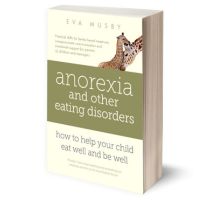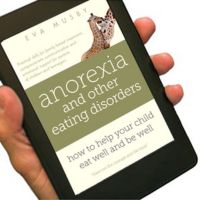Your cart is currently empty!

There are many outdated theories about what causes eating disorders. Here’s what you need to know so that you can focus on what matters. If your mum thinks you gave your child an eating disorder, show her this.
This is the whole of Chapter 5 of my book. A longer, earlier version is here, if you want a lot of detail.
This chapter will be brief because you need to concentrate on the powerful actions you can take now, not on what may or may not have caused your child’s eating disorder. (For research on causation and a reference to the ‘pack of cards’ metaphor I’m about to use, see the endnotes. )
My focus in this chapter is on anorexia, as that’s where the best causation research currently lies. Scientists tell us that the illness is ‘biopsychosocial’: an interaction of biology, psychology and social factors.
I’m thinking of a river which floods because of the combined effect of many streams. Contributors are also soil drainage, wind and rain. There isn’t a single cause.
For another analogy, picture how life is dealing each of us many genetic and environmental cards. Some increase the risk of anorexia, and some are protective. Many of the genetic cards relate to mental and to metabolic characteristics: anxiety, a high-achieving personality, a drive to move, body fat and insulin function, among many others. There is no single card that determines anorexia. Outcomes are more or less probable, depending on interactions between genes, and interactions with the environment.
Consider how weight loss involves the environment (eating behaviour, bereavement, stress, etc) and how it involves genes (such as those associated with metabolism). For plenty of people, weight loss is relatively harmless. For our children, though, it’s highly likely to activate anorexia. On the plus side, we expect our kids to enjoy lasting recovery as long as they keep their weight above a threshold. Epigenetics (how environmental factors dial the effect of genes up or down) may also explain complete recovery: genes that increase the risk of anorexia may get securely turned off.
Consider the 2020 Covid pandemic and its lockdowns. The four-fold rise in anorexia points to a strong environmental factor: it’s a fair guess that without the pandemic, many of the youngsters who flooded our clinics would not have had anorexia. But genes were also involved: plenty of desperately unhappy young people did not get anorexia.
In our children, malnourishment (an environmental factor) seems to dial up genes that previously only had a minor effect: we see perfectionism, poor self-esteem, rigidity, black-and-white thinking, depression and anxiety. Nutrition, weight regain – and eventually, recovery – move the dial in the opposite direction: the same genetic traits are expressed positively. Once recovered, our children get to shine: they’re often smart, conscientious, high achieving, determined, sensitive and kind.
Resist one-cause explanations
Simple explanations lure us in – including those that are unfounded. People casually say, ‘Anorexia is the fault of social media’ or ‘It’s all in the genes.’ Outsiders blame the parents, or the child, or society – anything that reassures them that, ‘It couldn’t happen to my child!
Our own thoughts easily turn to self-blame. Some parents worry that they caused the illness by giving free access to ‘junk food’, while others blame themselves for the opposite. While parents agonise about their supposed mistakes, they’re wasting the energy needed to make today’s meals work.
“I wish our therapist had told us what took us so long to find out: ‘This isn't anyone's fault and your child isn't doing this deliberately.’”
It's tempting to see one incident as ‘the cause’. A child started restricting after a health-promotion talk in school, or after finding some exercise videos, or after being fat-shamed by peers, or after a doctor commented on their BMI. More likely, such incidents were triggers to weight loss, which then led to anorexia because of all the other environmental and genetic factors in play.
Would my daughter have avoided anorexia if her friends had stayed nice? Perhaps, but chances are that some other incident would have tipped her over the edge.
Focus on what you can do, not what you could have done
Family-Based Treatment chooses to be ‘agnostic’ about causation. Clinicians want you to stop ruminating about what you did or didn’t do in the past, and to attend to the all-important ‘now’. Scientists do conduct research on causation, but meanwhile, we need to get on with the best treatment currently at our disposal. With agnosticism, FBT differentiates itself from older treatments, where precious time goes into a search for ‘root’ psychological causes.
Many parents begin treatment believing that to cure something, you first need to address what caused it. That makes sense with a burst appendix, but it’s not true for many areas of medicine:
“I treat patients with leukemia. I don’t need to know how they got it to treat them.”
In old treatments, there could be an assumption that parents caused the eating disorder and were harmful. This has now been turned on its head: we are a huge asset in our child’s recovery. Chapter 12 says more on treatments.
What if you know of a cause?
While your child’s eating disorder will not have a single cause, there may be a factor that stands out – like a major stream feeding a river in flood, like a push that caused a tipping point. What should you do about it?
Take our example: it was pretty clear that a name-calling incident triggered my daughter’s restriction, which led to weight loss and anorexia. We talked about it, we empathised, we checked that the friendships were restored, and we tried to get her to engage in trauma therapy. None of that provided a fix.
On the other hand, if you know that a causal factor is ongoing, do your best to address it. I speak with parents who have changed schools after realising how much bullying was going on. It hasn’t fixed the anorexia, but it’s helped bring progress.
Is there a trauma you are aware of? Ask your team to advise whether to help your child with that sooner rather than later. Chapter 12 has more on psychotherapy as an adjunct to the main treatment.
Maybe, now you are better informed, you regret some of your previous actions. Maybe you want to correct things you used to say. When the time feels right for that, check out the help on expressing regret in Chapter 14. But remember, there is not one cause to this illness, just a bunch of risk factors interacting with each other.
When your child is a lot better, you can spend more time investigating the environmental factors that increase or decrease risk: this will help with relapse prevention (more in Chapter 10). Recognise, also, that many environmental factors are not under your control. You can’t forever shield youngsters from triggers. But you can use unfortunate incidents to help your child practise self-care skills and become more resilient.
Your child didn’t choose to have an eating disorder
Your child didn’t choose the cards that life and genes dealt them. Before the illness struck and altered their brain, they’d never have chosen to feel as miserable as they currently do. The more we let go of judgements and accept that our children are the way they are, the more we can bring about change. Concentrate on living and breathing non-judgement and acceptance towards your child, and make that the culture in your household. More help on unconditional acceptance is in Chapter 14.
Parents with an eating disorder
Have you suffered from an eating disorder yourself? Do you presently suffer from one but manage to keep it under control? You may be scared that therapists will blame you for your child’s illness, or that they will consider you incapable of contributing to the treatment.
First, understand that because of genetics, it’s very common for both child and parent have – or have recovered from – an eating disorder.
It is perfectly appropriate that you should care for your child just the same as any parent. What matters is what you do now. The trials that validated Family-Based Treatment did not exclude parents with eating disorders. Note that the approach models non-judgement, so you should never feel belittled.
Be mindful of any shame, ambivalence or contradictions within yourself, as you get your child to eat and gain weight. This applies to all of us, eating disorder or not, because our environment is awash with toxic messages about food and weight.
Sometimes, if a parent’s eating disorder is still active, the child’s treatment re-energises it, bringing on extra suffering. If that’s you, you deserve your own support and treatment in parallel. Extra care is needed around those rarer parents whose eating disorder drives them to collude with their child’s illness and derail treatment. I have met a teenager whose mother supplied her with laxatives and helped her bin food. Clearly, someone else had to take on the teen’s treatment – in her case, it was her older sister.
Chances are you will be a source of great strength and compassion for your child, and you will know the art of being both firm and loving.
Why? Why us? How to let go
If you are losing precious energy asking ‘Why?’ or ‘Why us?’ please know that’s normal. Pause, put a gentle hand on your cheek, and send yourself messages of kindness. You are suffering. It really hurts when you think you could have done something different. You so want the best for your child. May you find clarity and courage.
Self-compassion will transform the pain better than reading heaps of research. It will move you towards deep acceptance of what is, summarised by this mantra:
“Shit happens.”
The Serenity Prayer
The Serenity Prayer may be more to your taste:
‘Grant me the serenity to accept the things I cannot change, courage to change the things I can, and wisdom to know the difference’
Chapter 15 has more tools to help you with acceptance and letting go. You have limited bandwidth, and much can be taken up with guilt and rumination. Redirect your attention and time to what will give your child effective help.
Next:
* Go to Chapter 6: Practical steps to help your child beat the eating disorder *
References [click]
References are in the endnotes of the book. You may find these useful:
Watson, H.J., Yilmaz, Z., Thornton, L.M. et al. Genome-wide association study identifies eight risk loci and implicates metabo-psychiatric origins for anorexia nervosa. Nat Genet 51, 1207–1214 (2019) doi:10.1038/s41588-019-0439-2 Follow Cynthia M Bulik for the latest, e.g her 2019 talk on youtu.be/KduYI304iro
Excellent short podcast on epigenetics of eating disorders: Howard Steigler on edcatalogue.com/episode-164-dr-howard-steiger-epigenetics-eating-disorders
About the rise of eating disorders during the COVID lockdowns: bbc.co.uk/news/uk-50969174 and eating disorder organisations across the world
The serenity prayer and verses similar to it, are available on Wikipedia: en.wikipedia.org/wiki/Serenity_Prayer
Last updated on:
Comments
-
Thanks for the informaiton on the cause. I want to bring in friends and family, but even in my first discussions/support seeking with only two friends, the cause was discussed and questions were asked. Both were directed at me (the mother) and my own behaivours around body image and food.
This is currently preventing me form reaching out, telling others, involving friends and family or asking for support. It helps me begin to formaulate my future response when confronted with stupid, questions, remarks and assumptions.
Thankyou.-
Hi Emma, this can indeed be tricky, or even extremely painful when it's someone we were close to. Sometimes we discover that people we thought loved us are attached to some theory about what caused our child's eating disorder, and sometimes we realise we've been judged harshly all along. Some parents say they discover who their true friends are. Some take refuge in groups of parents in a similar situation. Personally I enjoyed having a great therapist/counsellor, and I also have valued the discipline of directing my thoughts, so as not to poison my mind with unnecessary gumpf, so as to make space for more life-affirming stuff.
-
-
Easy to read, loads of info, but not leaving me mind boggled. I like your 'voice' is that the writers term? Feels like we're in a conversation.





LEAVE A COMMENT (parents, use a nickname)